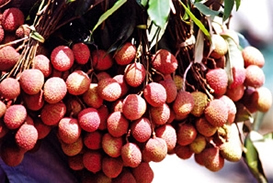Litchi
Litchi a fruit of Litchi chinensis (family Sapindaceae), consisting of a thin, brittle shell enclosing a sweet, jelly like pulp and a single seed. The original home of litchi is' China. It was introduced to Burma and India by the end of the 17th century. Litchi can be grown in every district of Bangladesh, however, presently it is being grown mainly in rajshahi, rangpur, dinajpur, jessore, kushtia, mymensingh and narayanganj. It stands second in production after mango among the tree fruits grown in the country.

Litchi plants are medium to large, much branched, round-topped and evergreen, reaching up to 12-15 metres. Leaves pinnately compound, leaflets 4-7, glossy-dark above and light green beneath. The tender, young leaves are brown and borne in periodic flashes.
The inflorescence is a compound raceme, bears small, off-white unisexual and bisexual flowers. The fruit is a one-seeded nut, develops in bunches and varies in shape and size. The edible portion of litchi is called aril, lies under the papillate, pinkish-red pericarp and completely surrounds the dark-brown, oily skinned seed. Litchi plant requires warm, humid climate for vegetative growth. Dry hot air is injurious for the fruits. Deep, loamy-alluvial soil is most suitable for litchi. Although it cannot tolerate waterlogging, it favours moist soils as the roots form mycorrhizae rapidly in soggy environment.
Most of the litchi varieties presently grown in different countries have been introduced from China. There are some seedling selections with promising fruit qualities in many countries. There is no such named variety of litchi in Bangladesh. Nevertheless there are many local selections with commercial fruit qualities under the main two types: deshi and bombai. The edible portion (50-75% of fruit wt) of litchi contains mainly carbohydrate (sugars), protein, fat, vitamins (B and C), calcium, and iron. The Litchi is usually eaten fresh. But it makes an excellent drink and canned fruit. Dried litchi, known as 'litchi nut' is very popular among the Chinese. [Muhammad Nurul Amin]
See also fruit.
